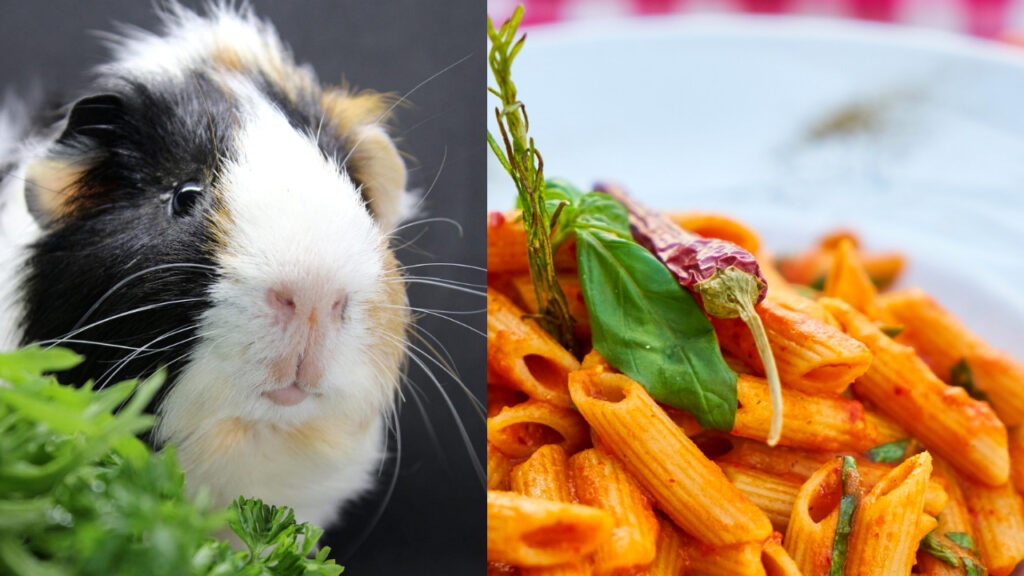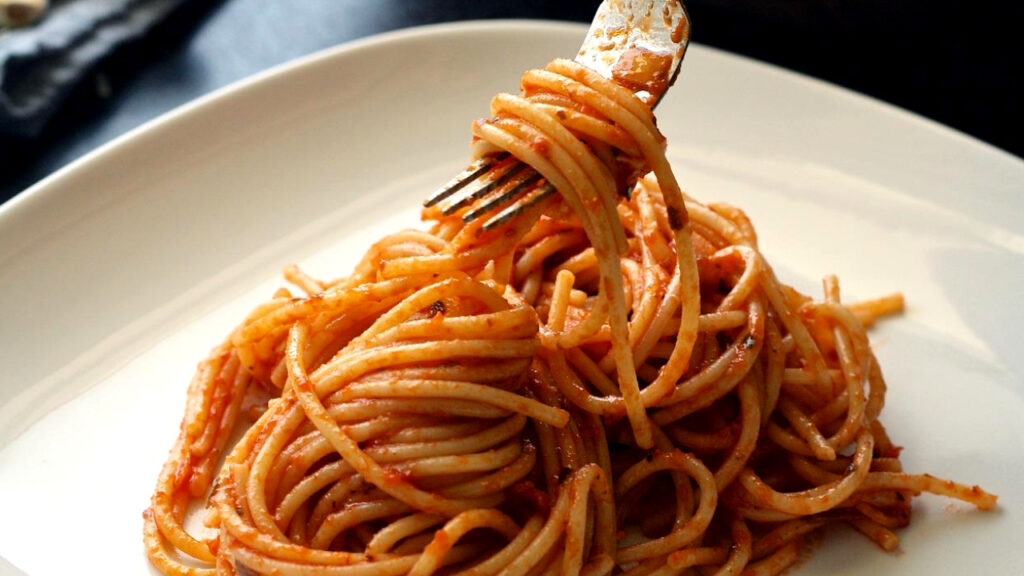
Pasta is a big No for guinea pigs.
This is because they are made with flour which is harmful to guinea pigs.
Guinea pigs are herbivores, and their digestive system cannot digest flour effectively, which leads to indigestion.
In this article, we will see why guinea pigs shouldn’t eat pasta and its risks.
Table of Contents
Can Guinea Pigs Eat Pasta?
Not really!
Guinea pigs shouldn’t eat pasta; they are obligate herbivores and usually eat herbs, vegetables and fruits.
On the other hand, pasta doesn’t contain any nutritional value for them.
It’s made with flour which is not suitable for guinea pigs, their digestive system is susceptible, and they cannot digest the flour very well.
As a result, your guinea pig may experience stomach related problems such as indigestion, bloating, tummy ache, diarrhea, and so on.
However, a small bite of pasta occasionally won’t harm your guinea but keep in mind most of their diet should consist of fresh hay, fruits and veggies.
Do Guinea Pigs Like Pasta?
Well, it depends!
This could be controversial.
The only reason your guinea pigs might nibble on uncooked pasta is because of its hard texture.
Guinea pigs constantly need to chew on something; otherwise, their teeth will grow longer, which can be problematic.
So, don’t get the wrong signal and feed pasta to your cavies; it’s made out of flour which can cause digestive problems.
Why Guinea Pigs Shouldn’t Eat pasta?
The primary reason why guinea pigs shouldn’t eat pasta because they are herbivores and usually eat low carb foods such as herbs, fruits and vegetables.
But pasta is made out of flour which isn’t good for them whether it’s cooked or uncooked.
So if you ever see them nibbling on pasta, it’s just because it feels good on their teeth.
Here are a few reasons:
Digestion Issues:
Guinea pigs have a fragile digestive system, and they can only process fresh hay, vegetables and fruits.
But pasta is made with flour which can be problematic for your guinea pigs.
They cannot digest pasta easily, leading to diarrhea, stomach aches, and other digestive-related problems.
Cardiovascular Troubles:
Pasta is usually made with wheat flour dough mixed with salt and water. The sodium might not be too high for us, but it can be really harmful to guinea pigs.
Excessive salt can increase blood pressure and damages cardiovascular organs over time.
Also, excessive sodium has a bad reputation for developing hypertension and water retention risk.
Therefore, it’s best to avoid foods that are high in salt.
Urinary Problems:
Pasta is made out of flour mixed with water. They contain a decent amount of calcium which is good for their overall bone tissue development but can be problematic if ingested in excess amount.
Too much calcium and phosphorus can be highly dangerous for guinea pigs, and it can cause the development of bladder and kidney stones.
As a result, your guinea pig may experience severe pain, nausea, fever, bloody urine, or urinary infections.
And these minerals should be strictly moderated if your guinea pigs have pre-existing kidney problems.
Causes Obesity:
Pasta is a high-calorie food and mostly contains carbohydrates which aren’t suitable for guinea pigs.
Guinea pigs usually eat low carb food like hay, fruits and vegetables. And consuming such high calorie-dense food can cause unnecessary weight gain, which leads to obesity.
Therefore, you should avoid feeding pasta to your guinea pigs and opt for other healthy alternatives.
How Much Pasta Is Too Much?
A few pieces!
While there is no fixed serving size, a small bite of macaroni or spaghetti shouldn’t be a problem.
Pasta is not something you should feed to your guinea pigs, and they are made with flour and can be harmful to the digestive system.
However, if your guinea pig loves to nibble on pasta, you can occasionally give them a few spaghetti strands.
Remember, guinea pigs have a sensitive digestive system, and pasta isn’t something they should have on a regular basis.
Are Guinea Pigs Allergic To Pasta?
Food allergies are very common in guinea pigs; however, pasta isn’t allergic to them.
But if your guinea pig has pasta for the first time, initially serve them a tiny bite, and if they didn’t show any allergic reaction, it means they are not allergic to the particular food.
Even if your guinea pig is not allergic, feeding pasta isn’t good for them and can cause severe health problems over time.
Can Pigs Eat Cooked Pasta?
Guinea pigs are herbivores and should eat raw and fresh hay, veggies and fruits.
Cooked food isn’t safe for them; it can lead to digestion issues.
Moreover, cooked pasta contains a large number of spices, seasoning sauces and vegetables.
All of these can be really harmful to your cavy, and some of them are even life-threatening.
Can Pigs Eat Noodles?
No, guinea pigs shouldn’t eat noodles whether it’s cooked or uncooked.
Just like pasta, noodles have no health benefits for your cavy.

So, there is no point in feeding them something that has no nutritional benefits for them.
And if your guinea pig eats too much pasta, it can cause several digestive problems like stomach upset, diarrhea, tummy ache, etc.
Therefore, you should never feed noodles to your guinea pig; instead, opt for other healthy alternatives.
Is Pasta Good For Pigs?
No, pasta isn’t good for guinea pigs; they are made with flour and can be harmful to them.
Once your guinea pig eats pasta, it will go into its stomach and cause indigestion, resulting in diarrhea and stomach pain.
Pasta is high in calories, contributing to obesity in the long term and eventually leading to other health problems.
Not only that, cooked pasta is more dangerous, they contain a huge amount of vegetables, spices, seasoning and so on.
Healthy Alternatives To Pasta
Pasta is not something your guinea pig should eat, and it can be really harmful to guinea pigs.
But it doesn’t mean your guinea pigs can’t have delicious treats.
Here I’m listing all the healthy vegetables that I have tried and found best for guinea pigs or heard from other parents.
Let’s start with the veggies:
Carrots:
They are high in sugar, so they shouldn’t be fed in huge quantities, but they are a great source of energy; some guinea pigs seem to really love them.
Bell Peppers:
Bell peppers are a great source of Vitamin C, and most guinea pigs love them.
Make sure to remove the seeds; yellow bell pepper has more vitamin c than green and red some guinea pigs seem to prefer the taste of a specific bell pepper color.
Chicory:
This is another great vegetable to be on your guinea pig treat. However, make sure to remove the outer layer of leaves before you give it to your guinea pigs.
Cucumber:
A fresh and watery vegetable which most guinea pigs love, could cause stomach problems if it’s fed in huge amounts but absolutely fine in moderation and, especially in summer.
Celery:
Celery should be cut into very small pieces so that your guinea pigs don’t choke on the strings.
Beetroot:
Beetroot is another healthy vegetable for your guinea pigs, but it should only be fed in small amounts and don’t worry if it changes the color of your guinea pig’s urine.
Courgette or zucchini:
Courgette or zucchini is a perfect vegetable for your little cavy; they are filled with vitamins and minerals.
Final Thoughts
To sum up this, pasta is not meant for guinea pigs, and they have almost no nutritional benefits for your pet.
Guinea pigs are herbivores, and they should be eating raw herbs, fruits and vegetables only.
And pasta is made with flour which can easily mess up their digestive system and lead to several health complications.
So, whether it’s cooked or uncooked, pasta is not safe for them.
Therefore, you should never let your guinea pigs have pasta; it can seriously harm them.
Other Useful Articles:
